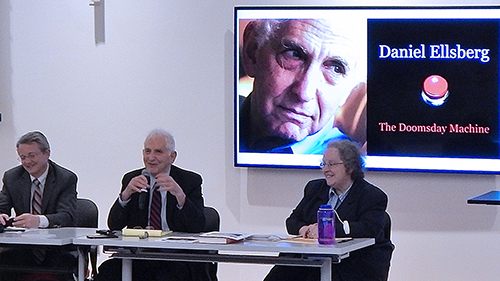Summer 2018 Newsletter
Whistleblower Daniel Ellsberg Shares Insight on U.S. Nuclear Policy
By Charlotte Dulany
Article first appeared in Beneath the Shell, a blog from the Merrill College of Journalism.
 Daniel Ellsberg (center), high-level defense analyst turned activist and the "most dangerous man in America," spoke at the University of Maryland on April 16 about his new book on the current and imminent threat of nuclear war.
Daniel Ellsberg (center), high-level defense analyst turned activist and the "most dangerous man in America," spoke at the University of Maryland on April 16 about his new book on the current and imminent threat of nuclear war.
Ellsberg was a military analyst in the Kennedy administration who released the top-secret Pentagon Papers in 1971. The papers contained evidence that the U.S. government had misled the public regarding U.S. involvement in the Vietnam War, and thus strengthened public opposition to the war.
His book, The Doomsday Machine: Confessions of a Nuclear War Planner, is an eyewitness exposé of the dangers of America’s 70-year-long nuclear policy that continues today. This is Ellsberg’s fourth book and was published in December 2017.
Looking back, Ellsberg acknowledges that at one point in history he possessed the most power in the country. "No one revealed the threats Nixon was making, and that is why I was the most dangerous man in America," said Ellsberg. "[Nixon] feared that I had endangered his policy of nuclear threats and that I had documents to prove so."
However, Ellsberg did not have such documents. Roger Morris, deputy to Henry Kissinger at the time, had taken photographs of the nuclear targets in the top-secret papers but did not release them. Morris told Ellsberg years later that it was his biggest regret in life that they did not throw open the safes and scream bloody murder. "Because that is exactly what is was," said Ellsberg.
The story of the leaked secrets is the basis for the new film The Post starring Tom Hanks and Meryl Streep.
Ellsberg was joined by Steve Fetter, interim dean of the University of Maryland Graduate School and associate provost for Academic Affairs at this university; Natalie J. Goldring, senior fellow in the Center for Security Studies and an adjunct professor in the Security Studies Program and UN Consultant for the Acronym Institute for Disarmament Diplomacy (UK); Tom Collina, director of policy for the Ploughshares Fund. All three are experts on nuclear weapons policy, nonproliferation strategy and disarmament issues.
The panel was hosted by Beyond the Classroom in the Edward St. John Learning & Teaching Center. Photo by Charlotte Dulany Aaron Doliana, second-year PhD student studying linguistics, asked Ellsberg why he decided to release his book now, and how to make the issue more interesting to the public so it can get more public attention.
"[President] Donald Trump has made this issue relevant and important," responded Ellsberg. "Currently one person has the sole order to decide to use nuclear weapons, and there is not much of an opportunity to question his order, even if it was believed to be unjustified or unwise." Ellsberg noted that when he spoke at a presentation last month, his introduction began with, "This man is no longer the most dangerous man in America… Now it is Donald J. Trump."
"Conflict is inevitable, but war is not," said Goldring. "We have a president who is seemingly extraordinarily impulsive and a structure in which he can literally make the decision himself to use nuclear weapons." The panelists proposed many solutions to overcome the unstable status of the nuclear threat. Most importantly is the need to educate people, and to work on local advocacy. They encouraged legislative leadership and to create pre-conditions for a ban treaty under the next political environment.
Collina highlighted that the public does not see the issue of nuclear war as a surmountable one. "Nuclear war is a policy issue, but the biggest problem is that people do not see it that way," he said. "Congress is making decisions today that will decide if we go to war with nuclear weapons in the future." Over the next 30 years, the United States will need to spend $1.2 trillion to sustain and modernize existing forces. "With these funds, the U.S. nuclear arsenal will withstand into the end of the century — and this locks us into our current predicament," said Fetter.
Ellsberg spoke to a full room of students and other attendees, many of whom asked for a signed copy of his book at the conclusion of the presentation. Beyond the Classroom hosted the discussion as part of their leadership and advocacy for nonprofits series.